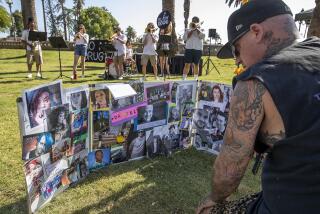SCIENCE / MEDICINE : Test of Revolutionary Anti-Rejection Treatment Awaited : Research: Lab results are promising for organ recipients. Success could eliminate the need for the lifelong use of harmful drugs.
- Share via
SAN ANTONIO — A revolutionary, one-time treatment to eliminate organ transplant rejection could be tested in kidney recipients within the next year, a Stanford University researcher reported here last week.
The process uses proteins called monoclonal antibodies to trick the immune system into recognizing foreign tissue as its own. It would eliminate the need for lifelong therapy with anti-rejection drugs that are themselves harmful to the body.
Speaking at an American Heart Assn. science writers’ meeting, Dr. C. Garrison Fathman, an immunologist and professor at Stanford, said the results in rats, mice and monkeys are so promising that researchers expect to begin trying the process in kidney transplant recipients within the next year.
“This allows the immune response to come back totally, so you’re not immunocompromised except for a short window of about 30 days,” Fathman said.
In contrast, anti-rejection drugs make transplant patients vulnerable to serious infections for the remainder of their lives.
Fathman described a technique that is based on a view of the immune system as a symphony orchestra whose performance is best altered by targeting its leader.
Antibodies--proteins released by the immune system in response to transplanted tissue, infections and autoimmune problems in which the body destroys its own tissue--all are produced at the behest of the orchestra conductor, the T-helper cells, he said.
Antibodies act by locking onto cells at specific sites called receptors. These vary from cell to cell.
Using the knowledge that the orchestra-leading T-helper cells all contain a receptor called CD-4, the Stanford researchers used purified, or monoclonal, antibodies produced in the laboratory to immobilize the CD-4 cells shortly before organ transplant. This disabled the tissue-rejecting part of the immune system.
Consequently, when pancreas cells and hearts were transplanted into rodents, their immune systems did not act against them.
Within a month, the immune system reconstitutes itself with new CD-4 cells that treat the transplanted tissue as a normal part of the body, Fathman said.
Furthermore, other types of T-helper cells are unaffected in this process, so the animals retain the immunities they have acquired throughout life through exposure to diseases and clinical immunization.
The technique has proven effective not only in whole-organ transplants but also in transplants of pancreatic “islet of Langerhans” cells, the insulin-producing cells that are destroyed by the body in one type of diabetes. But CD-4 therapy alone would not be permanent.
“The problem is you’re fighting two events. One is the rejection itself, and the other is the autoimmune destruction which occurred in the first place to drive off those islets,” Fathman said.
In essence, this immune-disabling technique temporarily mimics AIDS, which also attaches to T-helper cells at the CD-4 receptor, but it is unlikely to provide a target against AIDS itself, Fathman said. Although the antibody treatment would disable many T-helper cells infected with the AIDS virus, it would survive in different T-helpers and other cells, he said.
Early human toxicity tests of the CD-4-blocking antibodies have begun in patients with a leukemia that affects CD-4 T-helper cells, he said. Those are being conducted by Dr. Ron Levy, a Stanford oncologist who has specialized in developing cancer treatments using monoclonal antibodies. If these and monkey tests of the antibody technique prove successful, tests in human transplant patients would follow.
Kidney transplants would likely be the first operations in which the process would be tested in humans--since failure of the graft would not be fatal.
Theoretically, however, the process could be repeated with a different, more effective CD-4 antibody without any ill effects on the patient.
Fathman said his major concern about the process’ safety would be that, during the regeneration of about 1 billion CD-4 cells, there could be a gene mutation that would give rise to cancer, against which the immune system would have no defense.
If the technique works in humans, it would represent a major improvement in the quality of life for transplant recipients, who must take costly drugs for the rest of their lives. These lower the body’s resistance to all types of infections. The major anti-rejection drug, cyclosporin, can result in kidney failure. A newer drug, OKT-3, is itself rejected by the body eventually.






